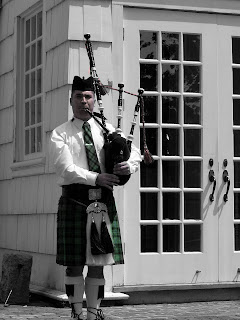It is best to start by explaining what it is to be a church piper. Afterwards, in a short series, I will tell how I became a church piper, to be called upon regularly to lead our congregation in worship, and to play for weddings and funerals.
Because a piper can play a few tunes on the pipes, it is not a sufficient credential to accept an invitation to play in church on a Sunday morning or for a church related ceremony such as a wedding or a memorial service. To my dismay and embarrassment, I heard a piper play “Scotland the Brave”and “Oh! Rowan Tree” for a wedding ceremony and they were played quite poorly. Afterwards, when asked about his choice of tunes, his reasoning was that the pieces he played didn’t matter, because people wouldn’t know the difference anyway. Besides, he said, it is the sound of the pipes that they want to hear and not specific selections. How wrong and poorly advised he was. In contrast, the instructions I received from my piping teachers were to consider always, that there is bound to be someone in the audience who definitely knows what should be played and how the pipes should sound.
That brings us to the most salient point of all, which is to consider the church piper’s character. When invited to play for a morning worship service for example, it is not so people will hear the majestic sound of the bagpipes. It is to have the piper lead them in praise of God by playing a carefully selected hymn or medley of hymns in which individuals can “hear the words.” People will praise God from their hearts, while the piper leads them in their worship, not attracting attention to himself or herself, but to God, the object of their worship. The music has to be so recognizable that one can distinguish the words, while the tuning and timing must be impeccable. Nothing less than perfection can be offered to God. Music half-practiced, played on a poorly tuned instrument is not sufficient. One has to be a disciplined musician able to recognize the sacred nature of a church worship service.
Because playing for a worship service is to bring honor to God, the person leading the service must have freedom of conscience, knowing there’s nothing in his or her character that would impede delivery of the musical offering to the Creator of the world, and the Saviour of mankind. It is a huge responsibility to bring a congregation in praise before God. Certainly, one needs to have taken time to pray that God would forgive him or her for whatever could cause a separation from God. In short, the church piper must have recognized that there were things in his or her life that at some time, were displeasing to God and must be forgiven so the offering of music will be unhindered and sincere.
In short, the church piper must know Jesus our Lord personally, recognizing that it was for the purpose of paying to God the debt owed for the piper’s sinfulness, that Jesus gave His life, and that His sacrifice has to be accepted as one’s own personal payment to God. The Scripture has to be meaningful to a church piper. It says, “For God so loved the world, that He gave His only begotten Son that whosoever believes in Him should not perish but have everlasting life.” The piper must live by this promise. Then, it is possible to come boldly before God, and He will listen to praise and requests whether verbal or musical. Otherwise, any piper, expert as he or she may be, who does not know Jesus in this personal way, cannot expect God to listen. He just will not hear. This is an extremely important part of becoming a church piper.
This is sufficient to start us thinking on the subject. Subsequent blogs will suggest the right music for specific occasions and the church piper’s role in the church. Personal experiences that helped to mould The Church Piper will be included. Discussion is welcomed.
Keith MacDonald, OD
The Church Piper



